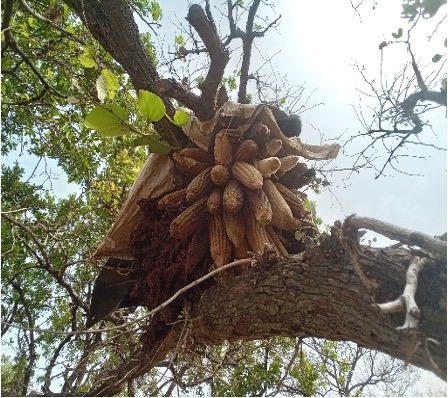
South Sudan depends mainly on oil revenues for economic development but there is huge potential in agricultural investment opportunities. 1Of the total population, 51% live below the poverty line and 78% depend on crop farming and animal husbandry as their primary source of livelihood. The food production system is largely dependent on traditional subsistence farming practices. Food shortages normally result in seed shortages as farmers in the traditional (informal) seed system, recycle their own harvested crop grain as seeds. Some seeds are also obtained through social capital network, market or through seed aid. The lack of information about some of the varieties provided as seed aid coupled with limited involvement of rural farmers in decision-making regarding variety introductions are some of the main hindrance to adaptation of these introduced varieties and its suitability.
As one means of mitigating the above challenges, the International Fund for Agricultural Development (IFAD) through the Seed Systems Group (SSG) funded a project with the broad goal of; Building Back Better Rural Livelihood Recovery Initiative in the Horn of Africa. The project encompassed Djibouti, Eritrea, Somalia and South Sudan. The main objectives are testing new seed varieties and multiplication of foundation seeds of improved varieties; Production of certified seeds of improved varieties and farmer outreach via Village-Based Advisors (VBAs) and Information Communication Technologies (ICT). Base Net, a national non-governmental organization was selected as a Partner and implemented farmer outreach via VBAs and ICT.
Mama Anyeza Dero is a seventy years old woman, living in a village called Radumu in Pageri Boma of Magwi County. She currently lives with her son and four grandsons. Mama Dero returned early this January 2022 from refuge in Uganda on her own accord. Mama Dero was one of the project’s beneficiary who received small packs of Cowpeas to plant by a village-based advisor called Wani. The later came to her in early April this year and asked if she would accept improved seeds packed in small quantities of 50 grams for trial against the local varieties she used to plant. She accepted the seeds but was reluctant to plant as the quantity was very small. She told Mr. Wani ‘I am going to try the seeds but God will punish you if the seeds did not perform well because I am too old to waste my energy for nothing’. When asked, why she was skeptical of seeds got from other sources other than her own or from her social networks, Mama Dero answered ‘I know good seeds is important for good harvest in farming but unfortunately, access to good quality seeds remain a big challenge to us in Pageri. We depend on seeds from organizations that often have poor germination. Even new pest (dudu) that do not exist here before comes with it. As a result we usually get low yield every year and it is waste of energy’. Laughingly, Mama Dero continued and said ‘I was surprised that Wani brought the seeds up to my home, this was unusual because I used to miss most of the assistance given by the organizations; because I am not as strong and active as I used to be in my youthful age. I thanked him a lot and he told me that his work was to bring the seeds up to the farmer, knowing she is old’. Mama Dero broadcasted the seeds provided to her by Mr. Wani in a small plot of about 12 meters square around her homestead. Mama Dero said she broadcasted the seeds but later learned in a practical training by Base Net staff how to prepare seedbed, planting in line and not wasting seeds. However, surprisingly, the seeds she planted germinated very well despite the dry spell in the village, meaning the seeds were very viable. She has harvested the crop but still in their pods, she expects to get a minimum of 2kg when threshed into grains. Mama Dero said ‘I believe the harvest could have been much more if I had planted the way we learned from the training. I am very happy, when the staff who trained us came, I told him to bring for me more of the seeds because the seed really have very many pods than the one, I used to plant’. Mama Dero said she would however; keep some of her Cowpeas as seeds for planting a bigger area in the coming season.
The Building Back Better Rural Livelihood Initiative Project has really come in with an innovative ways of reaching as many farmers in the targeted villages through the Village-based Advisors. Farmers, like Mama Dero were able to get good quality seeds at their locality and after planting, they were able to reap benefits. This approach of technology transfer has enhanced the extension and advisory service delivery. As the project ends, there is glimmer of hope that rural farmers were able to receive thematic skills training in production and quality inputs.
